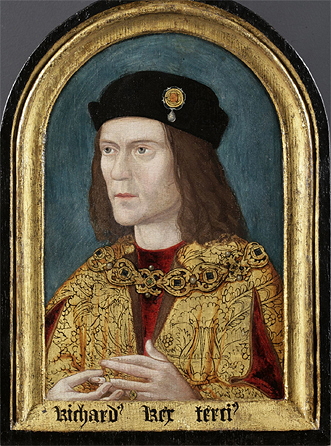by Susan Flantzer
© Unofficial Royalty 2024

John of Gloucester’s father, King Richard III of England; Credit – Wikipedia
Born circa 1468, John of Gloucester was an illegitimate son of King Richard III of England (reigned 1483 – 1485) and an unknown mother. He was called “of Gloucester” because his father was the Duke of Gloucester at the time of his birth. John was also called “of Pontefract” which may indicate that he was born at Pontefract Castle in the town of Pontefract, West Yorkshire, England. John’s paternal grandparents were Richard of York, 3rd Duke of York, a claimant to the English throne and the Yorkist leader during the Wars of the Roses until he died in battle in 1460, and Cecily Neville. Both Richard of York, 3rd Duke of York and Cecily Neville were great-grandchildren of King Edward III of England. John’s paternal uncle was King Edward IV of England.
John had one royal half-brother from his father’s marriage to Anne Neville:
- Edward of Middleham, Prince of Wales (1473 – 1484), died in childhood
There is little information about John’s childhood. He was one of two knighted on September 8, 1483, during the celebrations in York when his half-brother Edward of Middleham was invested as Prince of Wales. In 1485, King Richard III appointed his teenage son John to the position of Captain of Calais. Calais, now part of France, was an English possession from 1347 to 1558.

The corpse of Richard III, King of England, found on the battlefield of Bosworth; Credit – Wikipedia
The reign of John’s father King Richard III was only two years. On August 22, 1485, at the Battle of Bosworth Field, the last significant battle of the Wars of the Roses, the last king of the House of York and the Plantagenet dynasty, 32-year-old King Richard III of England, lost his life and his crown. The battle was a decisive victory for the House of Lancaster, whose leader 28-year-old Henry Tudor, Earl of Richmond, became King Henry VII, the first monarch of the House of Tudor. Soon after the Battle of Bosworth Field, King Henry VII removed John from the position of Captain of Calais. On March 1, 1486, King Henry VII granted John an annual income of twenty pounds. There are no further mentions of John of Gloucester in contemporary records after 1486.
As the son of a king of the House of York, even though he was illegitimate, John would have been a threat to the House of Tudor. Sir George Buck (circa 1560 – 1622), an English antiquarian, historian, scholar, and author, alleges in his 1619 book The History of King Richard III that John was imprisoned for some years before his supposed death in 1499. Buck wrote that in 1499, the year of the executions of Perkin Warbeck (a pretender to the English throne claiming to be Richard of Shrewsbury, Duke of York, the second son of King Edward IV and one of the “Princes in the Tower”) and Edward Plantagenet, 17th Earl of Warwick (a potential claimant to the English throne, the only son of George Plantagenet, 1st Duke of Clarence, the younger brother of King Edward IV), “there was a base son of King Richard III made away, and secretly, having been kept long before in prison.” Buck did not name the “base son of King Richard III” but he claimed that he was executed because an unspecified Irishman wanted to make him their ruler. John of Gloucester may have been held in prison for years and executed in 1499 but there are no other sources except Buck.
This article is the intellectual property of Unofficial Royalty and is NOT TO BE COPIED, EDITED, OR POSTED IN ANY FORM ON ANOTHER WEBSITE under any circumstances. It is permissible to use a link that directs to Unofficial Royalty.
Works Cited
- Beauclerk-Dewar, Peter & Powell, Roger. (2006). Right Royal Bastards – The Fruits of Passion. Burke’s Peerage & Gentry LLC.
- Flantzer, Susan. (2015). King Richard III of England. Unofficial Royalty. https://www.unofficialroyalty.com/king-richard-iii-of-england/
- Weir, Alison. (2008). Britain’s Royal Families – The Complete Genealogy. Vintage Books.
- Wikimedia Foundation. (2023). John of Gloucester. Wikipedia. https://en.wikipedia.org/wiki/John_of_Gloucester
- Wikimedia Foundation. (2024). Richard III of England. Wikipedia. https://en.wikipedia.org/wiki/Richard_III_of_England#Issue
- Williamson, David. (1996). Brewer’s British Royalty. Cassell.
